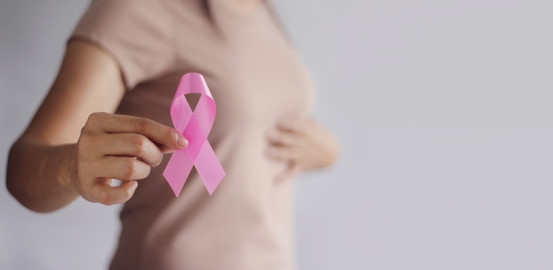Blog

Five Risk Factors for Breast Cancer (and When to Talk to Your Doctor)
With about one in eight U.S. women developing invasive breast cancer at some point in her lifetime, being aware of the most common risk factors is important.
Below are five key risk factors to keep in mind.
1. Weight
Women who are overweight or obese —which typically means having a body mass index of more than 25—have a higher risk of breast cancer. This is due to the fact that fat cells create estrogen, which can cause breast cancer to develop. The risk is higher after menopause. Being overweight also can increase the risk of recurrence.
A well-balanced diet and regular exercise can help you maintain a healthy weight. Be sure to have regular checkups with your primary care physician and OB/GYN to determine the ideal weight for your age, body type, and health profile.
2. Previous radiation therapy
Women who have previously undergone radiation therapy for the chest, breasts, or face before age 30—for conditions other than breast cancer, including Hodgkin’s disease—are at higher risk for breast cancer. If you had this treatment during adolescence, when the breasts are still developing, you may be at an even higher risk. It’s recommended that you consult with your doctor if you’ve had previous radiation treatment of any of the areas discussed above.
3. Age
Simply growing older can heighten your risk of breast cancer. Approximately two out of three invasive breast cancers occur in women age 55 or older. While you can’t change this, of course, it’s important to stay attuned to your body and maintain regular checkups with your OB/GYN.
4. Race and ethnicity
Although other women are slightly more likely than African-American women to develop breast cancer, the gap is closing. Under the age of 45, African-American women are more likely to have breast cancer and are more likely to die from breast cancer at any age. Asian, Native American, and Hispanic women are less likely to develop breast cancer and less likely to die from it.
Jewish Ashkenazi women are also more likely to develop breast cancer—and develop it at a young age—due to a gene mutation found in about one in 40 Ashkenazi women. If you’re of Ashkenazi descent and have a history of breast cancer in y0ur family, genetic counseling is recommended.
5. Dense breast tissue
Women with dense breast tissue — more fibrous tissue, less fatty tissue—have a 1.5 to two times higher risk of developing breast cancer than women with average-density breast tissue. Dense tissue can also make it harder to detect cancer on mammograms. If a mammogram report says you have dense breast tissue, consult with your doctor on how to stay on top of your breast health.
Learn more
To learn more about the risk factors for breast cancer or to set up a consultation with a specialist, reach out to Pacific Women's OB/GYN (PWOG) Medical Group.
Back to blog